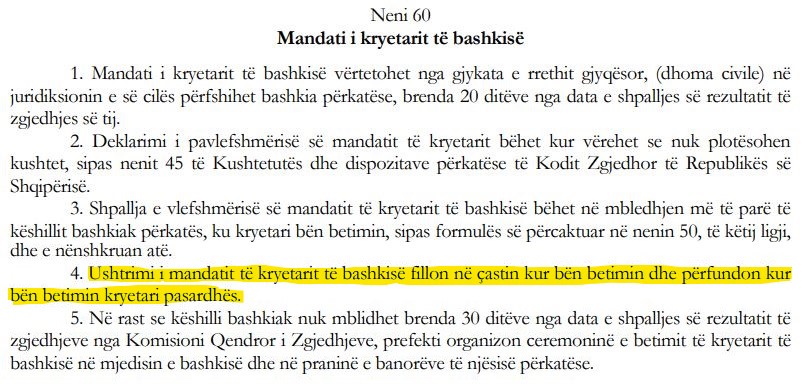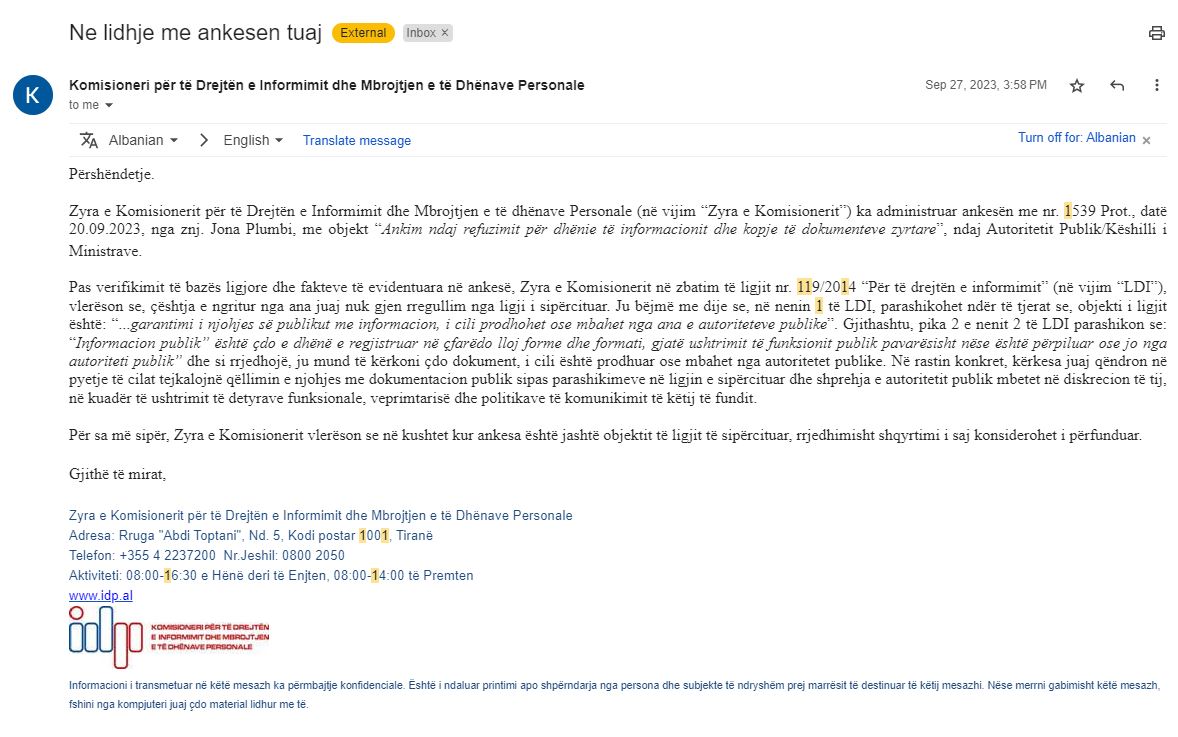The Special Court against Corruption and Organized Crime started the trial against Fredi Beleri for election crime, 5 months after his arrest. The start of the process was preceded by a war of arguments and legal claims, such as Prime Minister Rama’s statement that the government should dismiss the elected mayor as he did not show up to take the oath. The verification showed that the current law does not apply to Beleri and we are in a legal vacuum for the unprecedented case. Rama himself admits this, but 2 months after the statement where he claimed that he is consulting with a group of lawyers for a legal solution to the case, the Prime Minister and the MIA refused to answer what the result of the consultation is.
Jona Plumbi
On August 29, Prime Minister Rama, speaking about the case of Beleri, elected as mayor of Himara, declared that his dismissal, because he has not taken the oath to take the mandate, becomes possible for the government at the end of a period of 90 days. While quoting the law, Rama on the other hand affirmed that a legal working group has been set up for this.
We are studying the case, because when the 90-day period ends, normally according to what the law says, the government must dismiss the mayor-elect who has not appeared to take the oath and appoint a guardian until the new elections. But this is a very specific case, so for this reason I have asked the legal department at the Prime Minister’s Office to give an opinion on what we should do and we will do what is the most approproate. – Edi Rama on Top Channel
Based on this statement, Faktoje made a verification by consulting the law and experts in the field to understand if it applies in the case of Beleri.
The 90-day deadline and why it does not apply to Beleri
Prime Minister Rama says about the “Beleri” case that the government has the right to dismiss the elected mayor if he does not take his oath within 90 days, appointing a guardian until new elections are held.
The law that clarifies this part of the election procedure is the one on local self-government, which states that after the court certifies the mandate of the president announced by the Central Election Commission, based on the election results, he takes an oath at the first meeting of the municipal council, where the validity of his mandate is also announced.
Former Minister of Justice Ylli Manjani explains to Faktoje that the 90-day period is a final limit set to regulate cases, when even after this deadline the municipality does not have a mayor.
From the day of announcement as a winner in the CEC, you must take the oath within 90 days. 90 days is the final limit that regulates what happens to the municipality if there is no mayor for 90 days. But this depends on the will of the person – explains former minister Manjani.
The article of the law that sanctions the time period of 3 months related to the mayor’s appearance in office is article 62, which defines the cases when a mayor can be dismissed. Point c) states that the dismissal of the mayor can be proposed by the relevant municipal council for not appearing in office for a continuous 3-month period.

Ledio Braho, a member of the Complaints and Sanctions Commission at the CEC, points out to Faktoje that this article is inapplicable to the case, as Beleri is not the mayor today.
“He [Beleri] must first take the oath to take office. As we speak today, he is not the mayor. So today, if the Council of Ministers can dismiss someone, it is the current mayor, Jorgo Goro. If he does not go to work for 90 days, the Municipal Council proposes to the Prime Minister his dismissal.” – explains Braho for Faktoje.
This is clearly explained in the law when it is emphasized that “ the exercise of the mayor’s mandate begins the moment he takes the oath and ends when the successor mayor takes the oath.”

The only case when the elected mayor can be dismissed before time, without taking the oath, is when he “refuses to take the oath” according to Article 61 of the Law on Local Self-Government.

For the KAS member, Ledio Braho, Beler’s case is not related either to the “refusal to take the oath” or to the “dismissal for not appearing for duty”.
The law has made it clear when it says that the dismissal can be done when the mayor “refuses to take the oath”. – emphasizes Braho – so the law talks about the cases when the president does not want to take the oath, while Beleri has expressed in all possible ways that he wants to go and take the oath.
This is also what former Minister of Justice Ylli Manjani says this when he explains why this law is not related to the Beleri case.
“The law is about the case when you don’t show up, because you are not willing to show up. At this moment they can remove the mandate. But if you don’t show up, because they don’t let you show up, this is a new situation. The law we have does not cover this situation. There is no other law that foresees it, we are sui generis”. – says Manjani for Faktoje.
After the Prime Minister’s statement on the drafting of an opinion by the Prime Minister’s Legal Group, Faktoje inquired with the Prime Minister and the Media and Information Agency to get to know the working group and the progress made for this opinion. *The Prime Minister left the question unanswered, while after complaining to the Commissioner for the Right to Information, we were given the following argument:
“In the specific case, your request is based on questions that exceed the purpose of familiarization with public documentation according to the provisions of the above-mentioned law and the expression of the public authority remains at its discretion, within the exercise of functional duties, activity and communication policies of the latter.” – Commissioner for the right to information.

While the MIA stated that it had no comment on the matter in question.
Conclusion
Based on these data and public information, Prime Minister Rama’s statement that the law allows the dismissal of Fredi Beler from the Council of Ministers after 90 days if he has not taken the oath is untrue.
The unprecedented case is not foreseen by law and, according to experts, may require legal regulation. Until now, we do not have any information from the prime minister about which lawyers are dealing with the legal opinion and at what stage is this working group, which Rama mentioned on August 29.






